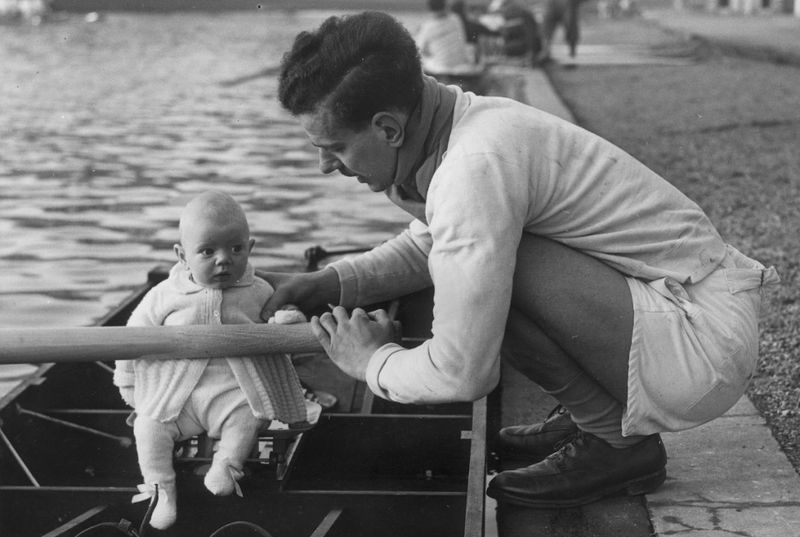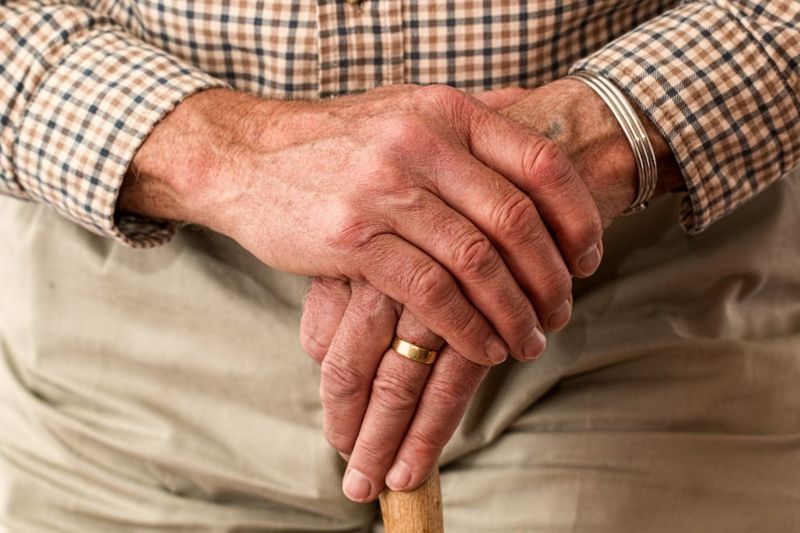Boomer men didn’t grow up with therapy memes, safe spaces, or language like “emotional regulation.” Instead, they were handed a rulebook for manhood that said you’re only as strong as the feelings you bury.
Think about it—whole generations of men trained to grit their teeth, bottle up their sadness, and call it “strength.” For so many, the habit stuck so deeply that even now, admitting to fear or pain feels impossible.
O resultado? Layers of silence, distance, and emotional confusion that ripple through families and relationships even today. We’re not talking about harmless quirks, either—these habits can leave scars that never quite heal.
Here’s a closer look at fifteen painfully real ways Boomer men learned to swallow their feelings, and why those old lessons are still tripping them up now.
1. “Boys Don’t Cry”—The Rule That Stole Tears
Nobody forgets the first time they were told to “toughen up” after falling off a bike. For Boomer men, this message wasn’t just one bad day—it was a lifelong instruction manual. Tears were seen as a sign you’d already lost, so you learned to hold them in, even when everything inside you hurt.
This isn’t just about the absence of crying. It’s about missing the chance to understand your own sadness, to let pain move through you. Years later, many of these men can’t even identify when they’re sad, because they stopped letting themselves feel it ages ago.
What’s wild is that this kind of emotional lockdown doesn’t just go away. It collects interest—showing up as health issues, relationship struggles, and a sense of always wearing a mask.
2. “Man Up!”—The Command That Shut Down Vulnerability
There’s nothing like the sting of being told to “man up” when all you want is a little comfort. This was the anthem of Boomer boyhood—every scraped knee, every heartbreak, every disappointment was a test of how fast you could stuff your feelings away.
It didn’t leave much room for softness, did it? Vulnerability became the punchline, and needing support was just another reason to feel embarrassed. The result: men who grew up believing that asking for help was admitting defeat.
Now, years later, opening up feels unsafe—even to the people closest to them. That pressure doesn’t just disappear when you grow up; it follows you into every argument, every quiet night, every time you wish you could just say, “I’m not okay.”
3. Naming Feelings Wasn’t on the Curriculum
If you grew up as a Boomer boy, chances are nobody ever asked, “How are you feeling?” Not really. Schools taught math, history, maybe some sports—but emotional vocabulary? Not a chance.
The only lessons were about “being a man,” not being human. Naming fear, disappointment, or even joy was never modeled, so most just learned to go blank instead. Emotional intelligence was missing from the syllabus, and the cost is still being paid.
That empty toolbox makes it tough even now. Many Boomer men still can’t find the words for what’s going on inside, so they freeze up or shut down, hoping nobody notices how lost they really feel.
4. Anger: The Only Emotion With a Hall Pass
Funny how anger got a free pass, right? For Boomer men, it was the one feeling you could let loose without judgment. Everything else—sadness, fear, confusion—had to be packed away.
The result? Anger became the default language for any kind of pain. If something hurt, it was just easier to snap, yell, or storm off than to admit you were actually scared or sad.
Decades later, some are still stuck in that loop. It’s not that they’re always angry; it’s that they never learned how to speak any other emotional language. And that leaves a lot unsaid.
5. Affection Was a Foreign Language
Hugs? Only on birthdays, and even then, it felt weird. For Boomer men, physical affection was rationed out like dessert—rare and awkward, never overflowing.
“I love you” wasn’t said out loud; it was supposed to be understood through hard work and showing up. But unspoken love leaves a lot of questions and more than a few lonely hearts.
Now, those habits linger. Grown men still flinch at hugs, struggle to say what they feel, and sometimes miss out on the warmth they secretly crave. It’s not about not caring—it’s about not knowing how to show it.
6. Mental Health? Not in This House
If you said you were anxious or sad, someone might joke, “What, are you crazy?” Mental health just wasn’t a topic—it was a punchline or a problem for other people.
Boomer men learned to treat their struggles like dirty laundry: hide it, deny it, never speak about it again. Therapy was for “broken” people, not regular guys just trying to get through the day.
But bottling things up doesn’t make them disappear. Decades of quiet suffering can pile up, turning into stress, isolation, and sometimes even health crises that could’ve been eased with a little bit of honesty.
7. Feelings Were Labeled “Feminine”—And That Wasn’t a Compliment
Being called “too emotional” was basically social death. For Boomer boys, anything resembling softness was instantly labeled as “girly” or “weak.”
So what did they do? They built up armor, learned to brush off hurt, and kept their distance from anything that might make them appear vulnerable. The lesson was drilled in: don’t be “soft.”
Years pass, but those walls stay up. Even in adult relationships, many still keep empathy and tenderness at arm’s length, missing out on some of the richest connections because the risk of ridicule still echoes.
8. Suffer in Silence? Absolutely
You get bad news, stare at the wall, and just grit your teeth. That’s what suffering “like a man” looked like for so many Boomer men. No complaints, no tears, just a quiet battle with whatever life threw at them.
Pain—emotional or otherwise—became something you handled solo. Needing support was a luxury, not a right. The expectation was to figure it out alone, no matter how heavy it got.
This habit hasn’t just faded away. Even now, when life gets overwhelming, the instinct is to retreat and deal privately, rather than reach out—even when connection is exactly what they need.
9. The Provider’s Burden—Never Needing Help
Carrying the world on your shoulders isn’t as glamorous as it sounds. Boomer men grew up with the belief that their job was to provide—emotionally and financially—without ever showing cracks.
The idea of saying, “This is hard for me,” just didn’t exist. You kept moving, kept providing, and never let on when the load felt too heavy. Vulnerability was painted as failure, not honesty.
Fast forward to now, and asking for help still feels foreign. These men can be surrounded by loved ones and still feel completely alone with their struggles, because letting anyone in feels like breaking the rules.
10. Friendship Without Feelings
Guys’ night meant sports, beer, and maybe a little trash talk—but bringing up feelings? Absolutely not. Boomer male friendships were built around activities, not deep talks.
If you needed comfort or advice, you learned to keep it light—or not bring it up at all. Genuine emotional support was almost unheard of. Loneliness could sit in a room full of friends and still go undetected.
That pattern stuck for decades. Many Boomer men still crave connection but aren’t sure how to get beyond the surface, stuck in a cycle of jokes and small talk when what they really need is a heart-to-heart.
11. Keeping Partners at Arm’s Length
Even with the love of their life beside them, many Boomer men kept emotional walls sky-high. The old lesson said their worth came from being strong, not open.
Opening up, even to a spouse, risked exposing weakness. Better to stay silent, keep things running smoothly, and avoid deep conversations about fears or doubts.
This can leave partners feeling shut out, longing for intimacy that never quite arrives. That distance becomes a quiet ache in marriages—one that neither really knows how to fix, because those old rules are still running the show.
12. The Cult of Emotional Self-Sufficiency
Needing comfort? Asking for reassurance? Those things were for other people. Boomer men were taught to handle everything themselves, no matter how tough it got.
This belief wasn’t just about pride—it became a point of identity. Admitting to needing anything felt dangerous, like letting the whole world see your soft spots. So they internalized every struggle.
Decades later, that habit is a hard one to break. Even when offered kindness, many Boomer men turn it away, convinced that real men don’t need a shoulder to lean on—or that letting someone in is just too risky.
13. Role Models Were Even Colder
You know those stories about grandpas who never said “I love you” and only gave advice through grunts? That’s the blueprint many Boomer men grew up with.
Their fathers were even more shut down—emotionally distant, never discussing feelings, just getting through the day. It set a standard, whether anyone realized it or not.
Without role models for honesty or emotional courage, the cycle just kept spinning. Many men still struggle to show warmth, not because they don’t care, but because they simply never saw how it’s done.
14. Saying Sorry Wasn’t Modeled—So Conflict Got Weird
When was the last time you saw a Boomer dad apologize? For so many, conflict meant shutting down or lashing out—not making amends.
They never saw real emotional repair modeled, so even now, “I’m sorry” feels foreign. Instead, arguments can drag on for days, with old wounds stacked on new ones, and nobody quite knowing how to lower their guard.
This habit can make family life feel like walking on eggshells. The discomfort never gets named, so it just sits there, growing heavier over time.
15. Softness and Strength: The Forgotten Combo
It’s a myth that being soft cancels out strength. Boomer men were told they couldn’t have both, but the truth is, real courage lives in the overlap.
Nobody ever told them that you can be tough and tender, brave and vulnerable. Decades later, some are just starting to discover this, usually in moments when love sneaks up on them—maybe with a grandchild, or an old friend, or a late-night memory.
Learning softness isn’t weakness is a lesson that can take a lifetime. But when it finally lands, it changes everything: love becomes richer, connections deeper, and the weight of old rules starts to fall away.
















